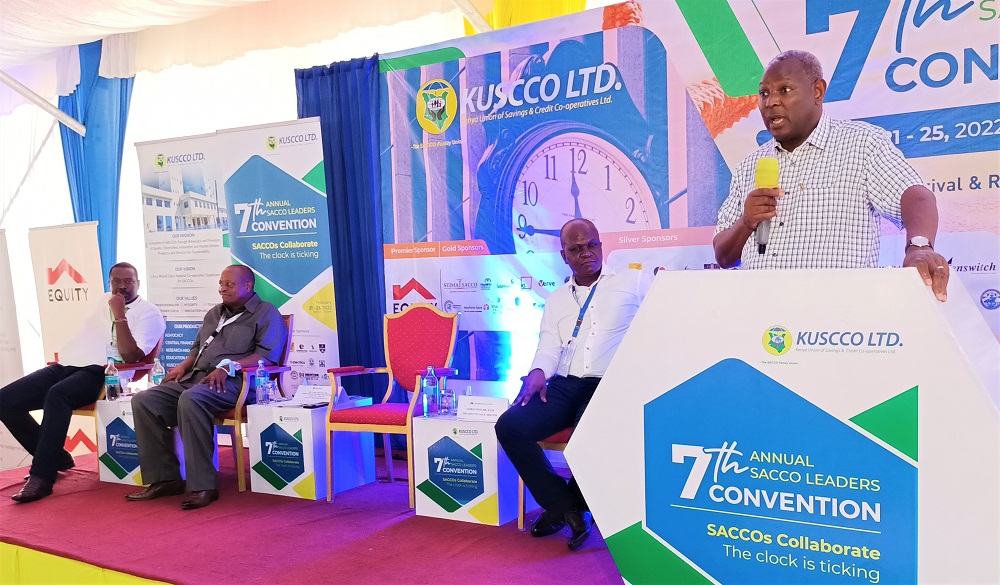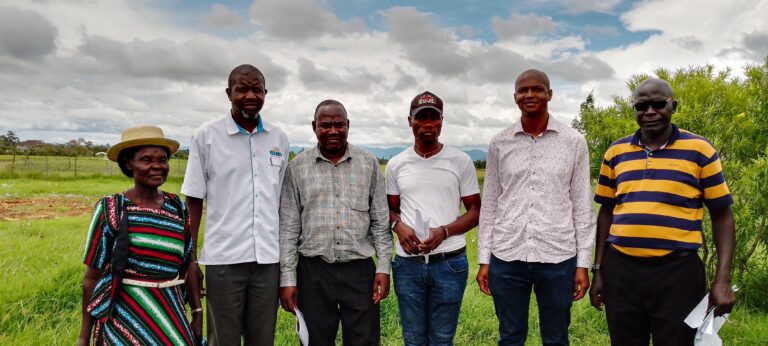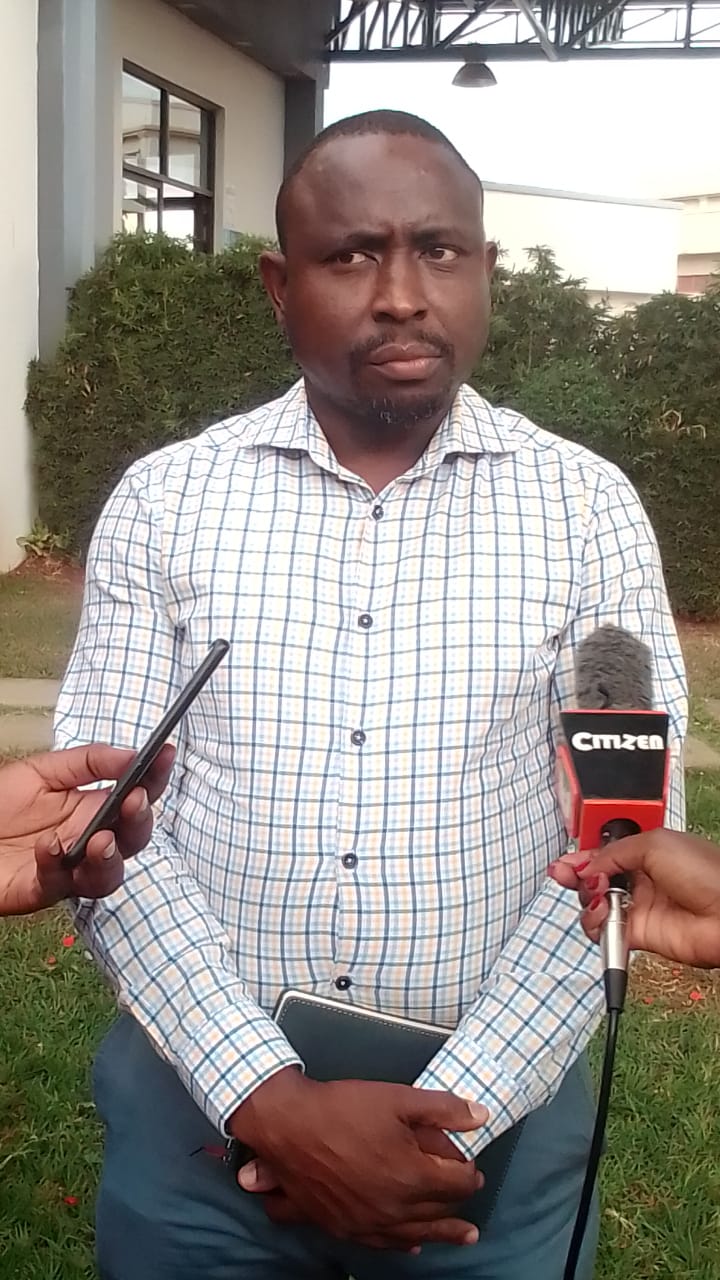By George Otieno
The Kenya Union of Savings and Credit Co-operatives Limited (KUSCCO) conducted its 7th annual Sacco leaders’ convention at the Sarova White Sands Hotel in Mombasa. The theme of the event was, “Saccos Collaborate: The clock is ticking.”
The three day event was graced by different Sacco players who converged to look at the best ways they can come together as industry players and accelerate the Sacco movement to greater heights.
Equity Bank CEO Dr. James Mwangi, who was the chief guest at the event, encouraged the Sacco players to collaborate and be consistent in their operations.
He pointed out that customers are always looking for products and service providers whom they can constantly trust and rely on.
“When you’re consistent in your behavior, members also become consistent in their behavior. When you stop doing things that generate growth, the growth also disappears. Members are always looking for a consistent, reliable and dependable relationship.” He said.
He invited Saccos to work together with Equity Bank. He also offered to collaborate with those willing to partner and utilize its already existing robust infrastructure to serve members effectively.
Sacco Societies Regulatory Authority (SASRA) CEO Mr. Peter Njuguna pointed out that Sacco founders expected that the only way to achieve greatness was if there was some degree of collaboration amongst the different players.
“We have realized that Saccos actually collaborate significantly with various service providers because Saccos alone cannot provide the services. Courtesy of the collaboration we have had so far, you will note that we have grown and indeed we are doing well every year both in deposits and our asset growth despite of the Covid-19 pandemic.” He said.
He added that the cooperative movement presently boasts of over 14 million members and that despite the number, there is still a huge potential for the movement to reach unimaginable numbers if Saccos come together, cooperate and collaborate to come up with efficient means of ensuring that products and services developed are responsive and attractive depending on the social economic environment they operate in.
Mr. Njuguna said that other than Saccos getting together to efficiently serve members, both the government and the entire industry needed to join forces in order to take the business to higher heights.
Mr. Njuguna added that as the cooperative movement makes strides to come together with other service providers to empower members through trainings, education and provision of quality, relevant and responsive products and services, it was also crucial to question if the collaboration was bringing the optimum and the desired results.
“Are our past partnerships, performances and collaborations able to sustain growth? What new aspect can we incorporate so as to serve members conveniently, efficiently, timely and in a secure environment? What can we change that will sustain growth and development of the sector in order to improve members’ lives?” the SASRA CEO posed.
He pointed out that even as Saccos expand through the establishment of Sacco branches, deployment of agency banking and exploitation of mobile and internet platforms to reach new members, the Saccos needed to measure their growth relative to the GDP so as to establish whether or not they are developing.
He encouraged delegates to look into the level, the intensity and the strategy used to accelerate development and find effective means to sustain growth even as they join hands by attending trainings and education forums such as KUSSCO’s leadership convention and others.
Mr. Njuguna urged the society not to see each other as competitors but instead use their partnerships as a distinctive advantage to reinvent their relationship as a powerful tactic approach to Saccos’ problems.
He further added that it was imperative for cooperative societies to understand the underlining needs of members as they endeavor to serve them.
“Saccos should seek alliances that enhance their stability, efficiency and deep inclusion that meet their visions and long-term goals as institutions,” he said.
The SASRA CEO expressed concern that certain Saccos were recording stunning growth each year while others were performing dismally.
“In 2019, the total assets of 175 institutions were in the hands of only 31 organizations commanding 70% of the total assets. Come 2020, they claimed more to get to 72% and in 2021, the percentage went even higher.”
Mr. Njuguna assured delegates that SASRA would stay true to its role of regulating and developing the industry by promoting sound business practices that are geared towards ensuring stability, growth of the entire industry, access of financial services and the protection members’ funds.
The Commissioner for Cooperative Development Mr David Obonyo said that some Saccos were greatly affected by the Covid-19 pandemic forcing many to close down and lay off their members.
“One of the major challenges Saccos experienced was non-remittances. This issue greatly affected Saccos based in the hospitality and tourism industry such as hotels. Quite a number of the hotels closed down and consequently had to lay off their members. Their closure meant that they were not able to remit their monthly deductions. The other challenge we are having right now is the low adaption of ICT through which Saccos can offer their services very effectively and efficiently to the members.” He said.
Mr. Obonyo advised Sacco leaders to explore other sustainable ways of acquiring income so as to overcome some of the prominent challenges facing Saccos presently.
Mr. Obonyo pointed out that the government is committed to creating a convenient working environment for Saccos to carry out their businesses effectively.
He said that the government is currently working on coming up with a nation-wide cooperative that will offer a platform for cooperatives to ride on and eventually protect them from cyber-attacks as well as assist them in offering quality services to their members.
He urged Saccos to employ creativity and innovation when coming up with products and services which are attractive and responsive depending on the different environment different Saccos operate in.
“You need to employ research, creativity and innovation when coming up with products and services. Stop copying products and services from other Saccos since Saccos operate with customers with different needs in different environments. Members want products and services that respond to their needs.” He said.
Mr. Obonyo noted that most Saccos had opened their common bond and rebranded to attract more people but warned that the move might become a distraction as it might lead to Saccos ending up with clients instead of members.
“The cooperative movement has basic beliefs and principals that drive members. Our business is to help members understand what a cooperative is and not misinterpret that a cooperative is a commercial bank where one banks money and withdraws it or takes a loan when in need.” He pointed out.
The commissioner underscored the importance of being realistic when declaring dividends and not being carried away by the dividends drift.
“The most important thing is the nature of services rendered to members and not the dividends shared to members since dividends are only issued once a year.” He said.
He further revealed that the state department was working closely with deposit taking Saccos to promote the Central Liquidity facility and the shared platform.
He talked of the cooperative bill that is currently before the cabinet waiting for approval before going to parliament for enactment.
Mr. Obonyo asked Saccos that hadn’t conducted their Annual General Meeting (AGM) for the last two years due to the Covid-19 outbreak to do so since it’s through the AGMs that key agendas like election of officials, presentation of audited accounts and budgets are deliberated.
Mr. Obonyo assured the delegates that an appropriate policy, regulatory and legal framework will be put in place to ensure sustainable growth and development of the cooperative movement at large.
Safaricom Sacco CEO Mr. Joseph Njoroge said that it’s very crucial for Saccos build their products and services with their customers or members in mind.
He added that products and services should be informed by customers’ needs since it’s customers who consume the products.
“When we were coming up with a system, our first thought was that the system must be able to respond to our customer needs. What are the pinpoints that our customers go through? What are our customers’ needs? We needed to have a reliable system that is able to support our operations and provide security for the members’ funds as well as help us in our vision.” Njoroge pointed out.
The convention further presented the perfect opportunity for the delegates to be taken through leadership training on various leadership aspects.
The Sacco heads were trained on how to be visionary leaders who think and dream big. The leaders should also plan to carry out the missions of their organizations, be skilled decision makers and be able to pull members together in order to see exponential results.
Dr. Bishop David Oginde of the Citum Church pointed out that a person’s commitment to a team will not make a difference unless one is willing to cooperate and collaborate with others to achieve results.



